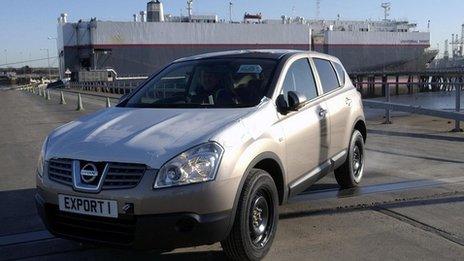UK current account deficit near record high at £22.4bn
- Published

UK exports fell 0.4% in the final three months of 2013, the ONS said
The UK's current account deficit was larger than expected in the final quarter of last year, official figures have shown.
The deficit in the three months to December was £22.4bn, only marginally lower than the all-time high of £22.8bn recorded in the previous quarter.
Economists had expected the UK's deficit to narrow to about £14bn in the final three months of the year.
One analyst described the deficit as "worryingly large".
The current account deficit for the year was £71.1bn, equal to 4.4% of UK GDP and slightly lower than the highest current account deficit of 4.6% of GDP recorded in 1989, the Office for National Statistics (ONS) said.
The UK's trade deficit with the rest of the world - the difference between the value of goods and services the country imports versus what it exports - narrowed to £5.7bn in the fourth quarter from £10bn three months earlier, the ONS, external said.
The fall in the trade deficit was partly attributed to Britain's dominant service sector - which accounts for nearly 80% of UK economic growth - which recorded a surplus in the quarter of £1.4bn.
The UK's trade deficit in goods also narrowed by £3bn. But this was the result of falling imports rather than any increase in exports.
Imports fell by £3.4bn in the period, the ONS said. Imports of oil, semi-manufactured goods and finished manufactured goods fell by £1.4bn, £1bn and £0.9bn respectively.
The value of UK exports fell by £0.4bn.
Howard Archer, chief UK and European economist at IHS Global Insight, said: "It has to be hoped going forward that improving global growth not only supports UK exports but also lifts earnings on UK investment abroad."
Export moves
A Treasury spokesman said although the current account had widened over the year, the data showed some "very good performance in the trade element".
He said: the trade deficit had almost halved between the third and fourth quarters, with exports increasing by 2.8% and imports falling by 0.4%.
"In the Budget the chancellor expressly said that we need to export more, hence the move to double the UK's export direct lending programme to £3bn and reduce the cost of long-distance flights for exporters and visitors to the UK by abolishing two tax bands," they added.
The UK's income account - the income from its overseas investments compared with the return other countries receive on their investment in the UK - recorded a deficit of £10.3bn in the quarter.
The ONS said the deficit in the income account was due to the pound strengthening against other currencies during the period.
Separately, the ONS kept its estimate for UK economic growth in the fourth quarter of 2013 unchanged at 0.7%.
But it revised down its figure for growth during 2013 as a whole to 1.7% from a previous estimate of 1.8%.
It added that the UK services sector had got off to a solid start in 2014, growing by 0.4% in January.